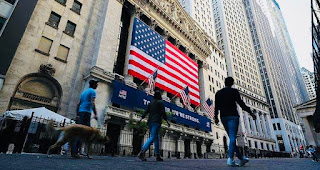CHINA RELATIONS IN AMERICA BEFORE BIDEN•••
CHINA RELATIONS IN AMERICA BEFORE BIDEN•••

The fact that the US diplomacy elite speaks of a "global coalition" against China and the "intellectual property problem" of one of China's diplomatic missions shows that the relations between the two countries are at odds.
As the presidential elections to be held in the US in November approach, the Donald Trump administration prefers to increase the commercial, geopolitical and diplomatic pressure on China. The US, which dragged its trade wars against China in 2018 to an intense "segregation" by blacklisting China's initiative, expanding its military presence in Asia-Pacific has brought the dose of competition to a critical level "reminiscent of the Cold War." Now, the two powers have opened the door to a new, intense and complex period of rivalry to the closure of the consulates and a debate on "Communist China and the Future of the Free World" by US Secretary of State Mike Pompeo.The prevalence of Cold War rhetoric in US-China relations is actually not new. The speeches of the US Vice President Mike Pence in the past years and the recent statements of Henry Kissinger that "the USA and China are on the brink of the cold war" have shown that this concern has emerged for some time. Chinese Foreign Minister Wang Yi even joined these statements and stated that the United States was "pushing the relations towards a new cold war". Although experts state that there are some historical differences, the geopolitical appetites of the two powers can trigger a style of competition that can go beyond the cold war.
For example, Stephen Walt points out that the world's two leading economic powers have "incompatible strategic visions", including China's desire to dominate Asia. Therefore, it warns of a period of "long-term competition". At the point reached today, issues such as the US diplomacy elite talking about a "global coalition" against China to defend the free world and closing one of China's diplomatic missions on the grounds of "intellectual property problem" show that the relations between the two countries have gone down. Does this point to a new Cold War? Or does it herald a more complex and intense conflict process in which new methods and fields emerge alongside traditional tools?
Calls for a global alliance to change China
The US administration has long thought that China is a threat to the US security, prosperity and even democracy. Indeed, current polarized American politics have begun to take a common stance on anti-China. Even Democrats, for example, provide reports to the Senate accusing China of "digital authoritarianism" and portraying China as the "new big brother" with a global surveillance goal. Some US politicians, whose theory of the Chinese threat has reached such a point, have now accepted the "Thucydides Trap" assumption. However, the closure of China's consulate in Houston and the speech of US Secretary of State Mike Pompeo, full of accusations against the Chinese Communist Party (CCP), indicate that a more complex period with high competition is entering.
To speak, Pompeo argues that the long-standing approach to participation and incentives towards China should be ended when choosing the Presidential Library of former US President Richard Nixon, who took historic and important steps towards normalizing relations with China. Calling for a "global and new alliance" to change China, Pompeo seems to have opted for an intense and competitive rhetoric against China, taking into account the growing election concerns in the United States. Pointing out that the theories of US leaders who think that China will become a free and democratic country are not correct, Pompeo says that the US urgently needs a strategy that protects its economy and lifestyle. He also emphasizes that the free world must change China, which he describes as the new tyranny, otherwise China will change them.
In his speech, Pompeo notes that the only way to change communist China is to act on how the Chinese leaders behave, not what they say. While acknowledging that there are differences between China and the USSR, Pompeo acknowledges that unlike the Soviet Union, China is deeply integrated into the global economy, but adds: "Beijing depends more on us than we do." In Pompeo's speech, efforts against China are "containment". Pompeo emphasizes that unlike the USSR, China is within the US borders, while saying that they are facing a more complex and new challenge.
US ready to go beyond Cold War rhetoric
In Pompeo's speech, there is a special emphasis on the Chinese Communist Party. Although this speech is defined as "the declaration of a new Cold War," Pompeo actually makes an assessment that goes beyond the Cold War. That is, he emphasizes that the relationship between the USA and China is more complex than the relationship between the USA and the USSR. According to Pompeo, this struggle between the USA and China is or will take place on a more complex, unlimited and dependent ground. That's why he thinks they are dealing with a new normal.
It is possible to read as the practice of Pompeo's speech that the USA closed the consulate general of China in Houston "to protect American intellectual property and private information of Americans". This unpredictable and unprecedented move of the USA is interpreted as an earthquake in US-China relations. On the other hand, the Chinese side's closure of the US consulate general in Chengdu in order to respond to the said move indicates that the retaliation period has begun. China's diplomatic approach, which generally prefers to avoid, continues to harden with the "warrior wolf" diplomacy.
Meanwhile, the United States announced that it has arrested a Chinese investigator who has been accused of concealing its relations with the Chinese Army and has been taking refuge in the Chinese consulate general in San Francisco for weeks. The court file alleges that the aforementioned researcher Tang Juan, who entered the US last December at the University of California with a training visa to conduct cancer treatment research, had ties with the Chinese Army. On the other hand, the US Justice Department made a claim last week that two Chinese hackers were trying to steal terabytes of data from western companies, including new types of coronavirus (Kovid-19) research. One of the most interesting moments among the recent tension in US-China relations seems to be the closure of China's consulate general in Houston by "police force". It is also claimed that China's consulate general in Houston was involved in the nationwide riots in the USA.
China is preparing for a future of unlimited competition
The recent sharpening of the USA's approach towards China causes China to respond with similar moves. Although China avoids the Cold War logic and rhetoric, it also admits that relations have shifted in that direction. While China, which is looking for dialogue channels through the Phase One Trade Agreement, especially in the field of trade, cannot get the expected response, it is trying to fend off the USA's moves on Hong Kong and the South China Sea. The USA's sending aircraft carriers such as the USS Nimitz and USS Reagan to the South China Sea and the exercise arrangement of the US, Japan and Australian navies in this region is considered to be an extremely critical process for China.
However, at this point, China especially
emphasizes that it is not seeking hegemony. The general logic of the strategic documents published by China on defense in recent years is based on "China never seeks hegemony". China does not hesitate to reiterate its belief in a multipolar world order that progresses peacefully and is dominated by economic growth. In this context, China, which has a post-Marxist character acting on a more pragmatist ground, tries to avoid the appearance of an ideological fight. China stresses that it is a strong advocate and supporter of multilateralism, trade, economic globalization and the United Nations (UN)-led international order.
However, China is also working feverishly to prepare for an uncertain future. In the white book titled "The National Defense of China in the New Era" published on July 22, 2019, China draws attention to the actions of the USA that undermine global stability and gives a special place to concepts such as "intelligent war and artificial intelligence." It is emphasized that information technologies (IT) -based high military technologies are much more necessary in the new era, and it is especially stated that the latest technologies such as artificial intelligence (AI), quantum information, big data, and the internet of things have become important in the military field. In fact, China sees 5G technology as the "facilitator" of the Fourth Industrial Revolution, just as the railways started the First Industrial Revolution.
On the other hand, China rejects this mentality while realizing that it is increasingly being drawn into a Cold War spiral with the USA. Chinese Foreign Minister Wang Yi particularly emphasizes that China is not interested in changing the US into a hegemonic power and that the US should give up its "dream" to change China.
Seeking new visions in multi-polar global order
Returning to the question we asked at the beginning of the article, we can define the new process between the two countries as a more complex and intense new Cold War era, in which new methods and fields emerged alongside traditional tools. The US-China relations have similarities with the Cold War period, as well as differing aspects. Conflict, strategic ambitions and ideological rift in the field of cyberspace and technology may herald a more dangerous geopolitical divide.
If the ongoing competition between the two powers is read through the similarities and differences, the most important similarity can be shown that the USA is a liberal democracy and that China has a communist ideology. Looking at past experiences, it is an important similarity, but it is necessary to admit that the transformation China has undergone with the period of reform and opening has had significant effects on its ideological structure and governance. Another important similarity is that the competition in question is on a global scale and both powers act with an approach to avoid a major conflict.
There are sides of the rivalry between the two powers that are not similar to the Cold War. In the Cold War between the USA and the USSR, the center of gravity of the competition in the ideological and geopolitical fields, it is seen that the center of gravity in the competition between the USA and China is "trade" and "technology". Geopolitical issues over Asia Pacific have also made themselves felt seriously recently. With the speech of Mike Pompeo, it seems that it has become clear now that he hopes for a "polarization" that will appear in his favor in parallel with the eroded global power of the USA in the strategic rivalry against China.
On the other hand, the US wants to use the
dynamism of the Cold War. Because the Cold War requires constant vigilance to remain a military and economic superpower. In fact, there are those who interpret this as a visionary perspective that enabled the Americans to go to the moon in 1969 and then to collapse the USSR. At least in the US elites, there is a prevalent opinion that a struggle against China in a new Cold War model has a good chance of success. But this can be an illusion. US-China relations, as Pompeo said, are very complex.
Today, the countries of the world do not have the necessary homogeneity to be camped in the framework of the Cold War. Almost every country that the US sees as its ally, especially itself, has an enormous commercial relationship with China. The interesting and important part of the job is that it exceeds the economic capacity of the USA to meet the commercial losses of the allies who will comply with the US 'wishes. Therefore, the willingness of these allied countries to participate in an anti-Beijing "Crusade" is weak. These countries want to maintain relations with Washington, but do not want to be dragged into a violent conflict. For example, Singaporean academic and diplomat Kishore Mahbubani argues that countries containing 20 percent of the world's population are willing to join an anti-China alliance, but the rest will not.
As a result, the USA and China stand out as two important powers that want to shape the 21st century. While it is obvious that China needs semiconductors from the USA in the field of technology, it is difficult for the USA to ignore China-based supply chains. But this dependency relationship cannot prevent an ideological and strategic split. While the US chooses to use a cold war-like polarization to control China, China hopes to be the center of gravity in the post-hegemonic future of the multipolar global order. In this context, China, which prefers a "protracted war", thinks the course is in its favor. The United States, on the other hand, is convinced of the necessity of an urgent intervention due to hegemonic concerns. Therefore, it is possible to say that an extremely dynamic and asymmetrical multipolar new Cold War era has begun. We can call this a hybrid competition period with increased intensity. A future similar to what has been experienced in the past does not await us. Therefore, all countries must be prepared for a complex, intense and uncertain period of global competition.
As the Italian philosopher Antonio Gramsci, known for deepening the concept of hegemony, said in the 1920s, "The old world is dying and the new one is having difficulty being born."
Hüseyin Korkmaz, who continues his studies in the field of US-China Relations and China's Foreign Policy, is continuing his doctoral studies in the International Security Department of the Institute of Security Sciences of the Police Academy]











Comments
Post a Comment